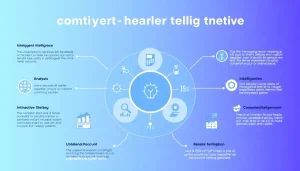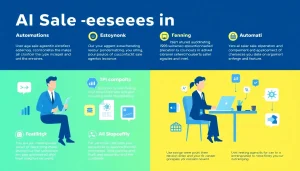Understanding AI Sales Agents
Definition and Functionality
AI sales agents, commonly referred to as AI SDRs (Sales Development Representatives), are autonomous applications designed to streamline and enhance the sales process. They leverage artificial intelligence to automate various tasks associated with outbound sales. These agents analyze and learn from vast amounts of sales and customer data, allowing them to perform actions such as lead generation, research, and personalized outreach with minimal human intervention. By effectively imitating human-like interactions, AI sales agents make it possible for organizations to improve efficiency and effectiveness in sales operations.
The technology encompasses natural language processing (NLP) to understand customer inquiries, machine learning to tailor interactions, and a variety of automation features to optimize workflows. Such capabilities not only simplify the complex sales landscape but also empower businesses to focus their resources on high-value activities. For those interested in leveraging these innovations, exploring AI sales agents can substantially elevate a company’s selling capabilities.
How AI Sales Agents Enhance Sales Processes
The integration of AI sales agents into sales workflows revolutionizes the way businesses interact with potential clients. These agents aid in multiple facets of the sales process. For instance, they can autonomously uncover new leads by sifting through data and social media platforms, identifying potential customers who fit predefined criteria. AI sales agents also assist in nurturing these leads through targeted communication, ensuring that each interaction is contextually relevant and personalized.
With AI systems able to analyze metrics such as engagement rates and interaction histories, teams can refine their sales strategies based on data-driven insights. This adaptability allows businesses to pivot quickly, matching their approach to changing market conditions without requiring extensive manual oversight. As a result, companies employing these advanced technologies often experience shorter sales cycles and increased revenue generation.
Key Technologies Behind AI Sales Agents
The operational backbone of AI sales agents rests on several key technologies. One of the most significant is natural language processing (NLP), which enables these agents to comprehend human language in context. NLP plays a crucial role in allowing AI agents to engage in meaningful dialogues with prospects, understand inquiries, and respond appropriately.
Another essential component is machine learning (ML). This technology enables AI sales agents to continuously learn and adapt from ongoing interactions and vast datasets. By analyzing patterns in customer behavior, preferences, and decision-making processes, AI sales agents become more effective over time, improving their accuracy and outreach capabilities.
Additionally, automation technologies streamline repetitive tasks. Features such as email sequencing, appointment scheduling, and reminders reduce the workload for human sales representatives, allowing them to focus on strategic engagements rather than administrative duties. The combination of these technologies creates a robust system capable of significantly enhancing sales effectiveness and customer engagement.
Types of AI Sales Agents
Chatbots as Sales Agents
Chatbots have emerged as one of the most recognizable forms of AI sales agents. Typically integrated into websites or messaging platforms, chatbots provide immediate responses to customer inquiries, facilitating real-time engagement. They can handle a variety of tasks, such as answering questions about products, guiding users through the purchasing process, and even qualifying leads by gathering crucial information from prospects.
Modern chatbots utilize advanced NLP capabilities, enabling them to understand context, recognize nuanced questions, and deliver accurate information. For businesses, this means reduced wait times for customers and improved satisfaction rates. Furthermore, chatbots operate 24/7, ensuring that prospects can receive assistance regardless of time zones or working hours.
Voice Assistants in Sales
Voice assistants, like Amazon’s Alexa or Apple’s Siri, are increasingly finding their way into the sales domain. These assistants leverage voice recognition and NLP technologies, allowing them to perform tasks through spoken commands. Organizations can implement voice assistants to assist sales teams in various ways, such as providing instant access to data, reminders for follow-ups, and even placing orders.
The use of voice technology in sales environments also offers a hands-free solution, allowing sales representatives to multitask while maintaining productivity. This function is particularly beneficial during meetings or presentations, where immediate access to information can enhance communication and decision-making.
Data-Driven Sales Tools
Data-driven sales tools are pivotal in enhancing the precision and effectiveness of AI sales agents. These tools integrate with various data sources and use analytics to offer insights into customer behavior, preferences, and purchasing patterns. By harnessing big data, sales teams can identify and prioritize leads with a higher likelihood of conversion, ultimately optimizing their sales efforts.
Tools such as CRM (Customer Relationship Management) software often incorporate AI functionalities to assess incoming data and deliver actionable insights. When paired with AI sales agents, these tools can provide comprehensive reports and forecasts, enabling sales teams to strategize effectively and make informed decisions based on past performance and market dynamics.
Benefits of Implementing AI Sales Agents
Increased Efficiency and Productivity
One of the primary advantages of implementing AI sales agents is the significant boost in efficiency and productivity they offer. By automating repetitive tasks, such as lead qualification and initial outreach, sales representatives can devote more time to high-impact activities such as relationship building, complex negotiations, and closing deals.
This automation not only accelerates the sales process but also minimizes the risk of human error. AI agents consistently perform at high levels of accuracy—ensuring no valuable leads are overlooked and that prospects receive timely responses. For organizations, this translates into shorter sales cycles and increased overall sales volumes.
Improved Lead Generation and Conversion Rates
AI sales agents play a vital role in enhancing lead generation efforts. By leveraging machine learning algorithms, they can analyze data and identify potential leads that fit targeted profiles. This leads to better quality leads entering the sales funnel, ultimately improving conversion rates as sales teams engage with prospects who are more likely to convert.
The personalized approach these agents take further aids in nurturing leads. By analyzing user behavior and tailoring communications to meet the needs and preferences of specific individuals, AI sales agents can effectively guide prospects through the sales journey, enhancing their engagement and interest.
Cost-Effectiveness for Businesses
While the initial investment in AI sales agents may appear considerable, the long-term cost benefits are undeniable. By streamlining sales operations and automating time-consuming tasks, organizations can reduce operational costs associated with hiring additional staff and can ensure that existing staff is utilized for more strategic roles.
Additionally, with sales AI improving lead generation and conversion rates, the revenue increase often outweighs the costs associated with technology adoption. Companies that effectively implement AI sales agents frequently find themselves in a position of competitive advantage, resulting in sustainable growth and profitability long-term.
Challenges in Adopting AI Sales Agents
Integration with Existing Systems
One of the formidable challenges businesses face when incorporating AI sales agents is the integration with existing systems. Many organizations rely on a patchwork of software solutions, and bringing AI capabilities into play can be a complex process.
To overcome this hurdle, businesses should prioritize compatibility and ensure that the AI tools they choose can integrate seamlessly with their existing tech stack. It is often beneficial to conduct an audit of current systems and workflows to identify areas for improvement and to work with providers who offer integration support to streamline the implementation process.
Data Privacy and Ethical Considerations
With the proliferation of data-driven technologies, concerns regarding data privacy and ethical considerations are paramount. AI sales agents collect, store, and analyze vast quantities of personal and behavioral data. It’s crucial for organizations to implement robust data protection measures to comply with regulations such as GDPR and CCPA.
Transparency is a critical aspect of maintaining trust with customers. Clearly communicating how AI agents utilize their data and ensuring that privacy measures are in place can act as a mitigative strategy against backlash and build customer confidence in the technology.
User Acceptance and Training
The success of AI sales agents heavily relies on user acceptance and proper training. Employees may be hesitant to adopt new technologies, perceiving them as a threat to their jobs. It’s essential for organizations to foster an environment that encourages learning and illustrates the value that AI agents bring in augmenting their capabilities rather than replacing them.
Implementing comprehensive training programs that cover the functionalities and advantages of AI sales agents can help alleviate fears and promote acceptance. Involving teams in the selection and implementation process also helps ensure that the tools meet their needs and fit seamlessly into their workflows.
Future Trends for AI Sales Agents
Advancements in Machine Learning
As machine learning continues to evolve, AI sales agents are expected to become even more sophisticated and autonomous. Enhanced algorithms and data processing capabilities will enable these agents to analyze larger datasets and derive insights faster than ever before. This advancement will contribute to higher accuracy in lead scoring and prioritization, making the sales process even more effective.
Future iterations of AI sales agents may also incorporate predictive analytics, allowing them to forecast trends based on historical data. This predictive capability could empower sales teams to anticipate customer needs and preferences, providing tailored solutions before prospects even articulate their requirements.
Personalization and Customer Experience
The ultimate goal of implementing AI in sales is to enhance customer experience through personalized interactions. As technology progresses, AI agents will be able to create and maintain a cohesive narrative for prospects across multiple touchpoints, delivering interactions that feel tailor-made.
From understanding customer preferences and pain points to recommending products or solutions at precise moments in the buyer’s journey, AI agents’ ability to curate experiences will set new benchmarks for customer engagement. Further advancements in sentiment analysis will also allow AI agents to adapt their communication style to align with customers’ emotional states, improving satisfaction and loyalty.
AI Sales Agents in Remote Work Environments
The shift towards remote work has fundamentally altered the sales landscape, and AI sales agents are well-positioned to flourish in this setting. They can facilitate seamless communication between remote teams and clients, ensuring that sales processes remain smooth and efficient regardless of physical location.
Additionally, AI agents can provide invaluable support to sales teams navigating virtual interactions by optimizing online engagement strategies. By analyzing customer behavior in digital spaces and fine-tuning outreach strategies, AI sales agents allow businesses to maintain strong customer relationships, even when face-to-face interactions are not possible.






